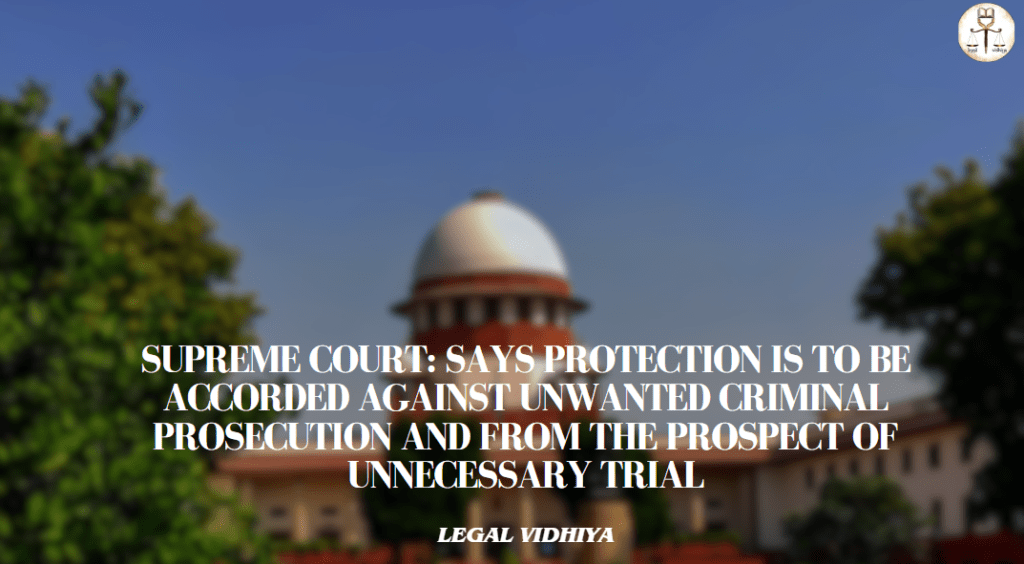
The bench comprising Justice Vikram Nath and Justice Ahsanuddin Amanullah held in this appropriate case, “protection is to be accorded against unwanted criminal prosecution and from the prospect of unnecessary trial”.
The court summarized the dispute between the landowners/principals inter-se or between them and the PoA(Power of Attorney)-holder. The court believes it would be inappropriate to include the appellant in criminal proceedings given that he was not involved in the PoA- holder’s misdeeds against the landowners or principals or in the prosecution of the PoA.
Senior Advocates Siddhartha Dave and Maninder Singh represented the State and the appellant, respectively.
Man Vijay Singh accused Raj Kumar Karan Vijay Singh of using a PoA to illegally sell family property. A legal notice to revoke the PoA was sent, but it received no response. Following that, a criminal complaint was filed, with accusations of misusing PoA, stealing property, and completing a fake Sale Deed. Charges under Sections 409, 467, 468, 471, and 420 of the Indian Penal Code, 1860 resulted from the police’s final report. The Chief Judicial Magistrate took cognizance. The motion to quash the FIR at the Dumraon Police Station in Buxar, Bihar.The High Court’s decision to reject the motion to quash the FIR was upheld by the Court in response to an appeal.
The appellant argued that they are just the vendee of a piece of land that was covered by the PoA. Regarding the terms, which were clearly binding between the parties, it was argued that it was an internal matter between the landowners/executors of the aforementioned PoA. The PoA’s provisions, particularly Clause 3, were brought to the Court’s notice by knowledgeable senior counsel, who also argued that the PoA-holder was right to execute any kind of deed and to be given consideration on behalf of the PoA’s landowners and executors as well as to have it registered. Regarding the civil nature of the case, it was argued that the Revisional Court correctly determined that it was a civil dispute because the matter included interpreting numerous PoA clauses, which
cannot be done in a criminal procedure. The fact that the Buxar Courts would not have territorial jurisdiction was also brought up.
It was also argued that the PoA was valid at the time of the sale and that the PoA holder had complete authority to sell the property, register the Sale Deed, and obtain payment under Clauses 3 and 11 read in conjunction with Clause 5. He argued that the complaint had not properly relied on Clause 15, which was not applicable.
The court determined that there was a case for intervention. The PoA was signed by the landowners/principals in favour of the individual from whom the appellant bought the land, which is an undisputed and admitted fact. Additionally, it is a fact that the PoA-holder completed a Sale Deed in the appellant’s favour and had it registered in Dehradun. A lot of discussion was focused on interpreting the various PoA provisions—namely, clauses 3, 11, and 15.
The reference taken by the court is traceable to Forbes v Git, [1922] 1 AC 256 and Radha Sundar Dutta v Mohd. Jahadur Rahim, AIR 1959 SC 24.
The court further added that this matter of jurisdiction is restricted to the transaction of the execution of the Sale Deed in the appellant’s favour and not to any other disagreement or dispute that the principals/landowners may have, whether it be with one another or the PoA holder. Additionally, a suit for the same cause of action that the landowners/principals filed in Dehradun before the FIR was filed was dismissed in the appellant’s favour, and a particular motion to annul the Sale Deed was refused.
The Court claimed it improper to involve the appellant in criminal litigation, as he had no role in the PoA’s execution or any misconduct by the PoA-holder. The entire consideration amount is paid by the appellant.
CASE NAME : BHARAT SHER SINGH KALSIA v. STATE OF BIHAR & ANR.
NAME :RIYA KRISHNA , COURSE : BBA LLB Hons , COLLEGE :MAHARASHTRA NATIONAL LAW UNIVERSITY, AURANGABAD ,INTERN UNDER LEGAL VIDHIYA.
Disclaimer: The materials provided herein are intended solely for informational purposes. Accessing or using the site or the materials does not establish an attorney-client relationship. The information presented on this site is not to be construed as legal or professional advice, and it should not be relied upon for such purposes or used as a substitute for advice from a licensed attorney in your state. Additionally, the viewpoint presented by the author is of a personal nature.







0 Comments